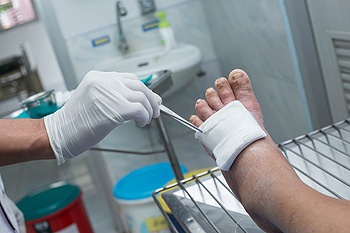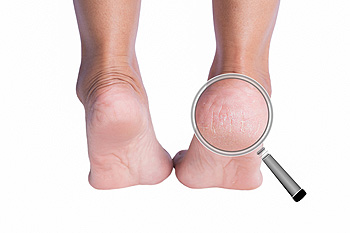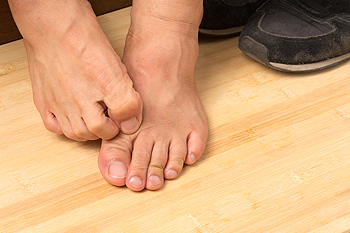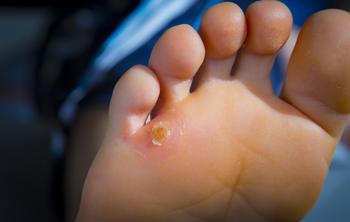
 Active children may be more likely to experience heel pain. This pain can be indicative of a condition known as Sever’s disease, and can target children and young adolescents. This uncomfortable ailment affects the growth plate in the heel and can occur as a result of extensive pressure exerted on the area where the Achilles tendon meets the heel. Parents may notice their child may begin to limp, in addition to experiencing a decrease in flexibility if their child is afflicted with Sever’s disease. Prompt treatment generally begins with stopping the activity that caused this condition, and it is beneficial to rest the affected foot. Some children find it may help to perform specific stretches that target the Achilles tendon and calf. If you notice your child has symptoms of Sever’s disease, it is strongly suggested that you schedule a consultation with a podiatrist as quickly as possible who can determine what the most effective treatment is.
Active children may be more likely to experience heel pain. This pain can be indicative of a condition known as Sever’s disease, and can target children and young adolescents. This uncomfortable ailment affects the growth plate in the heel and can occur as a result of extensive pressure exerted on the area where the Achilles tendon meets the heel. Parents may notice their child may begin to limp, in addition to experiencing a decrease in flexibility if their child is afflicted with Sever’s disease. Prompt treatment generally begins with stopping the activity that caused this condition, and it is beneficial to rest the affected foot. Some children find it may help to perform specific stretches that target the Achilles tendon and calf. If you notice your child has symptoms of Sever’s disease, it is strongly suggested that you schedule a consultation with a podiatrist as quickly as possible who can determine what the most effective treatment is.
Sever's disease often occurs in children and teens. If your child is experiencing foot or ankle pain, see Dr. Harris L. Klear from Burlington County Podiatry Associates. Our doctor can treat your child’s foot and ankle needs.
Sever’s Disease
Sever’s disease is also known as calcaneal apophysitis, which is a medical condition that causes heel pain I none or both feet. The disease is known to affect children between the ages of 8 and 14.
Sever’s disease occurs when part of the child’s heel known as the growth plate (calcaneal epiphysis) is attached to the Achilles tendon. This area can suffer injury when the muscles and tendons of the growing foot do not keep pace with bone growth. Therefore, the constant pain which one experiences at the back of the heel will make the child unable to put any weight on the heel. The child is then forced to walk on their toes.
Symptoms
Acute pain – Pain associated with Sever’s disease is usually felt in the heel when the child engages in physical activity such as walking, jumping and or running.
Highly active – Children who are very active are among the most susceptible in experiencing Sever’s disease, because of the stress and tension placed on their feet.
If you have any questions, please feel free to contact one of our offices located in Marlton and Delran, NJ . We offer the newest diagnostic and treatment technologies for all your foot and ankle injuries.
 Patients who are diabetic can suffer from foot problems. These can include a variety of ailments, including foot ulcers, neuropathy, and bone deformities. Diabetes can happen as a result of elevated blood sugar levels, and it is important to keep blood sugar levels regulated. Minor cuts, scrapes, and bruises can lead to major complications, and the healing process is often delayed. If a foot ulcer has developed, it is important to keep any weight off of the affected foot, as this can help to accelerate healing. If you are diabetic, it is strongly suggested that you regularly have podiatric visits. Podiatrists can help you to manage this condition and its effects on your feet.
Patients who are diabetic can suffer from foot problems. These can include a variety of ailments, including foot ulcers, neuropathy, and bone deformities. Diabetes can happen as a result of elevated blood sugar levels, and it is important to keep blood sugar levels regulated. Minor cuts, scrapes, and bruises can lead to major complications, and the healing process is often delayed. If a foot ulcer has developed, it is important to keep any weight off of the affected foot, as this can help to accelerate healing. If you are diabetic, it is strongly suggested that you regularly have podiatric visits. Podiatrists can help you to manage this condition and its effects on your feet.
Diabetic foot care is important in preventing foot ailments such as ulcers. If you are suffering from diabetes or have any other concerns about your feet, contact Dr. Harris L. Klear from Burlington County Podiatry Associates. Our doctor can provide the care you need to keep you pain-free and on your feet.
Diabetic Foot Care
Diabetes affects millions of people every year. The condition can damage blood vessels in many parts of the body, especially the feet. Because of this, taking care of your feet is essential if you have diabetes, and having a podiatrist help monitor your foot health is highly recommended.
The Importance of Caring for Your Feet
Patients with diabetes should have their doctor monitor their blood levels, as blood sugar levels play such a huge role in diabetic care. Monitoring these levels on a regular basis is highly advised.
It is always best to inform your healthcare professional of any concerns you may have regarding your feet, especially for diabetic patients. Early treatment and routine foot examinations are keys to maintaining proper health, especially because severe complications can arise if proper treatment is not applied.
If you have any questions please feel free to contact one of our offices located in Marlton and Delran, NJ . We offer the newest diagnostic and treatment technologies for all your foot and ankle needs.
 The foot condition that is known as cracked heels can be unsightly and uncomfortable. It can occur as a result of standing on hard surfaces for the majority of the day, or wearing shoes that have an open back. Additionally, existing medical conditions including eczema and psoriasis may lead to developing cracked heels. It is beneficial to receive regular pedicures, and it may help to stay hydrated by frequently drinking water. There are patients who find mild relief when their feet are soaked in warm water, and it often helps to use a good moisturizer. If you have cracked heels and would like more information about how to prevent and treat them, please consult with a podiatrist.
The foot condition that is known as cracked heels can be unsightly and uncomfortable. It can occur as a result of standing on hard surfaces for the majority of the day, or wearing shoes that have an open back. Additionally, existing medical conditions including eczema and psoriasis may lead to developing cracked heels. It is beneficial to receive regular pedicures, and it may help to stay hydrated by frequently drinking water. There are patients who find mild relief when their feet are soaked in warm water, and it often helps to use a good moisturizer. If you have cracked heels and would like more information about how to prevent and treat them, please consult with a podiatrist.
If the skin on your feet starts to crack, you may want to see a podiatrist to find treatment. If you have any concerns, contact Dr. Harris L. Klear from Burlington County Podiatry Associates. Our doctor can provide the care you need to keep you pain-free and on your feet.
Cracked Heels
It is important to moisturize your cracked heels in order to prevent pain, bleeding, and infection. The reason cracked heels form is because the skin on the foot is too dry to support the immense pressure placed on them. When the foot expands, the dry skin on the foot begins to split.
Ways to Help Heal Them
Ways to Prevent Cracked Heels
If you are unsure how to proceed in treating cracked heels, seek guidance from a podiatrist. Your doctor will help you with any questions or information you may need.
If you have any questions, please feel free to contact one of our offices located in Marlton and Delran, NJ . We offer the newest diagnostic and treatment technologies for all your foot care needs.
 Athlete’s foot, or tinea pedis, is a fungal infection of the skin fn the feet. There are four main types of athlete’s foot, all of which have a different clinical presentation. Chronic hyperkeratotic tinea pedis causes scaling and thickening of the skin on the soles of the feet. Chronic intertriginous tinea pedis causes scaling, redness, and peeling of the skin between and under the toes. Acute ulcerative tinea pedis is characterized by wet, swollen, pruney skin lesions with scaly borders between the toes. This type of athlete’s foot is more likely to get a secondary bacterial infection. Vesiculobullous tinea pedis is characterized by blisters forming on the soles of the feet. If you suspect that you have athlete’s foot, see a podiatrist for a proper diagnosis and treatment.
Athlete’s foot, or tinea pedis, is a fungal infection of the skin fn the feet. There are four main types of athlete’s foot, all of which have a different clinical presentation. Chronic hyperkeratotic tinea pedis causes scaling and thickening of the skin on the soles of the feet. Chronic intertriginous tinea pedis causes scaling, redness, and peeling of the skin between and under the toes. Acute ulcerative tinea pedis is characterized by wet, swollen, pruney skin lesions with scaly borders between the toes. This type of athlete’s foot is more likely to get a secondary bacterial infection. Vesiculobullous tinea pedis is characterized by blisters forming on the soles of the feet. If you suspect that you have athlete’s foot, see a podiatrist for a proper diagnosis and treatment.
Athlete’s foot is an inconvenient condition that can be easily reduced with the proper treatment. If you have any concerns about your feet and ankles, contact Dr. Harris L. Klear from Burlington County Podiatry Associates. Our doctor will treat your foot and ankle needs.
Athlete’s Foot: The Sole Story
Athlete's foot, also known as tinea pedis, can be an extremely contagious foot infection. It is commonly contracted in public changing areas and bathrooms, dormitory style living quarters, around locker rooms and public swimming pools, or anywhere your feet often come into contact with other people.
Solutions to Combat Athlete’s Foot
Athlete’s foot can cause many irritating symptoms such as dry and flaking skin, itching, and redness. Some more severe symptoms can include bleeding and cracked skin, intense itching and burning, and even pain when walking. In the worst cases, Athlete’s foot can cause blistering as well. Speak to your podiatrist for a better understanding of the different causes of Athlete’s foot, as well as help in determining which treatment options are best for you.
If you have any questions please feel free to contact one of our offices located in Marlton and Delran, NJ . We offer the newest diagnostic and treatment technologies for all your foot and ankle needs.
 Corns and calluses are similar in that they are both patches of dry skin that can appear on the feet in response to friction. Corns are small lumps of hardened skin that resemble a corn kernel in appearance. They often form on the soles of the feet or in between the toes and can be yellowish in color. Calluses are larger patches of rough, thick skin that often appear on the balls or heels of the feet. While both corns and calluses can usually be treated with conservative methods such as wearing wider, more comfortable shoes, moisturizing the skin, and wearing thicker, cushioned socks, certain cases may require medical intervention. If you have diabetes, circulatory problems, notice signs of infection such as bleeding or pus discharge, or are in severe pain, please seek the care of a podiatrist.
Corns and calluses are similar in that they are both patches of dry skin that can appear on the feet in response to friction. Corns are small lumps of hardened skin that resemble a corn kernel in appearance. They often form on the soles of the feet or in between the toes and can be yellowish in color. Calluses are larger patches of rough, thick skin that often appear on the balls or heels of the feet. While both corns and calluses can usually be treated with conservative methods such as wearing wider, more comfortable shoes, moisturizing the skin, and wearing thicker, cushioned socks, certain cases may require medical intervention. If you have diabetes, circulatory problems, notice signs of infection such as bleeding or pus discharge, or are in severe pain, please seek the care of a podiatrist.
If you have any concerns regarding your feet and ankles, contact Dr. Harris L. Klear of Burlington County Podiatry Associates. Our doctor will treat your foot and ankle needs.
Corns: What Are They? and How Do You Get Rid of Them?
Corns can be described as areas of the skin that have thickened to the point of becoming painful or irritating. They are often layers and layers of the skin that have become dry and rough, and are normally smaller than calluses.
Ways to Prevent Corns
There are many ways to get rid of painful corns such as wearing:
Treating Corns
Treatment of corns involves removing the dead skin that has built up in the specific area of the foot. Consult with Our doctor to determine the best treatment option for your case of corns.
If you have any questions please feel free to contact one of our offices located in Marlton and Delran, NJ . We offer the newest diagnostic and treatment technologies for all your foot and ankle needs.